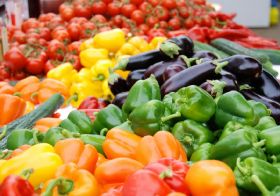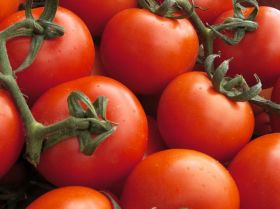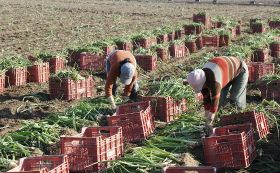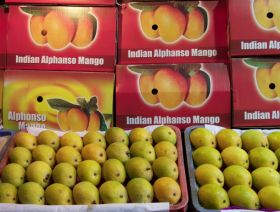Horticulture news
Little Kitchen Harvest launches new chilli micro-plant to meet current consumer trend of ‘micro-leaf cuisine’
Specialist micro-plant cultivator Little Kitchen Harvest is set to hit UK retailers with an exclusive range of innovative micro-plants.

The unique plants have been developed to meet the current consumer trend of ‘micro-leaf cuisine’ and produce a continuous crop in the comfort of kitchens across the country.
The upcoming launch will focus on chillies, and be followed later in the year by a series of selected micro herbs.
A Little Kitchen Harvest spokesperson, said: “Spice is trending strongly and consumers love the interaction of being able to grow and then cook with their own produce.
“We’ve worked for two years on breeding our ‘Mighty Mouse” variety chilli pepper – to give tantalising heat but with zesty aromatics, so It’s a great hit of spice and flavour; perfect for Mexican or Thai cooking, but versatile enough for soups and sauces.”
Each micro-plant is complemented with a bespoke ceramic pot that is magnetised so that it can easily fit safely to the side of a fridge or any other magnetic surfaces in the kitchen.
The company’s spokesperson, added: “As well as creating great dishes, the products are fantastic gifts and we hope to tap into the fresh flower market.
“The launch has been devised to coincide with both Father’s Day and the upcoming festival season; where Taste Of London festival goers will be the first to see the new line.”
Pots will be priced at £5 each and initially available via www.littlekitchenharvest.com
Little Kitchen Harvest is a start-up company specialising in bringing the home-grown experience into suburban and urban kitchen spaces.
Horticultural Innovation Partnership outlines plans for Supply Chain Group to bring greater collaboration and understanding

The Horticultural Innovation Partnership (HIP) is establishing a Supply Chain Group to help better understand what is needed to drive the industry forward.
HIP, which was established in March 2013 and published its first annual report last week, has identified a diverse range of players from growers to consumers that will form the new group. It will also look to include views from related sectors such as agricultural equipment, packaging and transport.
The new group, which was recommended as a result of an analysis of the supply chain, will aim to identify the challenges requiring innovation, with an initial focus on the fresh produce sector.
The analysis also identified the need for a separate Ornamentals Group, which has now been formed and is focusing on the amenity and landscape industries.
A Research Funders Group has also been set up, aiming to achieve “better co-ordination and connection between funders through the sharing of knowledge to deliver a more effective pipeline of relevant research for horticulture.”
In a further success for the project, HIP has won the competitive tender to become co-ordinator for the BBSRC Horticulture and Potatoes Initiative, wherein HIP is “steering researchers to focus on industry-relevant challenges and ensuring that funding goes to those who will accelerate the translation of results into practical applications.”
HIP outlined its next steps as continuing to engage with funders, research providers and supply chains to achieve better co-ordination of funds and deliver a more effective pipeline of relevant research; performing a detailed analysis of the landscaping supply chain; and exploring mechanisms to bring further supply chain research funding into the community.
John Rix takes over at Greenvale’s Vales Produce Growers from Tony Bambridge, who has been chairman since its inception
Greenvale potato grower group Vales Produce Growers (VPG) has appointed John Rix as its new chairman.

He takes over from Tony Bambridge, who has been chairman of VPG since its inception.
VPG exists as the formal supply base for Greenvale, one of the UK’s leading suppliers of fresh potatoes handling 500,000 tonnes of potatoes every year.
Greenvale provides the group with marketing options both internally and externally to a wider customer base, as well as providing technical support packages through a UK-wide agronomy team.
Bambridge was instrumental in developing the group from the previous Anglian Produce co-operative to its current structure, providing a more flexible framework for supply more suited to the current challenges in the supply chain and potato sector.
He has been noted in particular for influencing the processing steering group, Vales McCains and the Birds Eye supply group, and will remain on the board of VPG.
Rix has had a very long association with Greenvale, and says he is a dedicated supporter of the strong customer relationships that they have established. His ambition with regard to VPG is to try and invigorate a progressive relationship between the excellent grower membership, the Greenvale business and their customer profile.
“I am convinced there is much that can be achieved to develop trust, commitment and profitable activity in a more closely attuned vertical supply chain in what is a rapidly changing fresh produce business,” he added.
Rix is currently chairman of PG Rix (farms) Ltd., based near Colchester in Essex.
His potato production of 370 hectares supplies nine varieties on 100% committed contracts with Greenvale. The farm’s onion production of 380 hectares is wholly dedicated to the family-owned packing business Stourgarden.
Greenvale’s sales and trading director Doug Bell, said: “We are very happy to have a grower of John’s profile and quality in the chairman’s role, and I am sure this move will add further strength to the VPG group”.
Growers claim the modifications effectively give Morocco free access to the European market
Spain has criticised a European Commission to reform the Entry Price System for tomatoes claiming it will cause significant harm to Spanish producers by clearing the way for a massive influx of Moroccan tomatoes during the peak of the Spanish season.

The Commission announced on Monday that it would modify the way it calculates entry prices to include cherry tomatoes, instead of just round tomatoes. The proposed change will raise the average entry price and effectively means that Morocco will be allowed to export to the EU tariff-free as the entry price at which point the tariff is activated will always be higher than the preferential price of €46.1 per 100kg.
Murcian exporter association Proexport accused the commission of caving in to pressure from Morocco and other non-EU countries and effectively given them free access to the European market.
“This decision is a disaster for Spain’s tomato producers and leaves us defenceless,” said José Hernández, president of Proexport and Fepex’s Tomato Committee. “This will bring about a new pricing crisis and provoke growers to abandon farms leading to significant job losses.”
The Spanish government has been calling for the Commission to apply the rules set out under article 4 of the Association Agreement between Morocco and the EU, which requires that exports from the African country are maintained at a stable level to avoid oversupply. It also called for the entry price to be raised in order to offset the effects of the changes to the method of calculating the entry price.
EU imports of Moroccan tomatoes have increased from 194,000 tonnes in 2004 to 369,000 tonnes last year.
Award is the first level of accolade in the Responsible Business Awards, run by the charity Business in the Community
East of England Co-op has been recognised with a ‘Big Tick’ as part of the prestigious Responsible Business Awards 2014 –

The Big Tick is the first level of accolade in the Responsible Business Awards, run by the charity Business in the Community, which recognises businesses that are making a positive difference to society and to the environment.
The award organisers noted the way that East of England Co-op’s Sourced Locally programme has had a transformational effect on the regional economy since it began in 2007.
Through payments to local growers and producers, more than £24 million has been ploughed back into the local economy, and helped producers to create over 300 new jobs, as well as protecting many more.
Kevin Warden, local and fresh foods manager for East of England Co-op, said: “The success of Sourced Locally keeps growing and gaining the Big Tick again this year is great news. We’re always talking to new suppliers, and looking for new products to add to our shelves. We have saved food miles, encouraged local suppliers to work together and given customers the chance to buy products which are produced and grown in their area.”
A Big Tick is a leading endorsement of responsible business, and companies are awarded for initiatives tackling a range of issues: from stimulating local or rural communities, building long-term partnerships with schools, inspiring young talent, to embedding environmental sustainability into how products and services are used by customers.
Stephen Howard, chief executive at Business in the Community, said: “The Responsible Business Awards shine a much needed spotlight on the powerful impact of business. Each of the companies recognised are playing their part to build a new contract between business and society and a more sustainable future for us all. I congratulate the East of England Co-op for its’ Big Tick reaccreditation, which is a powerful symbol of business doing more to bring about change.”
Morrisons unveils second round of ‘permanent’ price cuts of up to 41% across 135 products

Pineapples and tinned tomatoes are among the latest round of price cuts by Morrisons as the retailer tackles ongoing price pressure from discounters.
Giant pineapples have been reduced from £2 to £1.25 for one, while a 400g tine of Don Mario tomatoes is reduced to 69p.
“This is another major price reduction programme,” said Morrisons CEO Dalton Philips. “These are permanent price cuts, not promotions, and they won’t be the last.”
The second round of price cuts will see products slashed by up to 41%, with an average reduction of 14%. Cuts will be predominantly in grocery and household items and include a mixture of brands and own-brand.
The news comes as the beleaguered retailer announced it would be axing up to 2,600 jobs as part of a change to its management structure.
Philips told BBC News: “This is the right time to modernise the way our stores are managed.
“These changes will improve our focus on customers and lead to simpler, smarter ways of working.”
Meanwhile rival Sainsbury’s appears to be taking the ‘if you can’t beat them join them’ approach by relaunching Netto in the UK. CEO designate Mike Coupe said: “”This joint venture provides a great opportunity for us to gain exposure to the high growth discount market for the first time in partnership with Dansk Supermarked.”
Welsh grower Perkin Evans wants the NFU to keep lobbying Brussels to ensure food producers’ tool-boxes aren’t ‘depleted’
Farmers fear Europe is fast becoming an over-regulated environment to operate within, NFU Wales has found.

A new campaign by the union, called ‘Healthy Harvest’, has just been launched in response to concerns that already flat-lining UK crop production will go into further decline if Welsh farmers continue to lose access to key plant protection products.
Statistics show that since 2001, half the plant protection products on the market have been lost, and over the next five years, half of what is left could also disappear from the market owing to overzealous regulation, not backed up by sound science.
“Our toolbox as food producers is becoming increasingly depleted, at the very time we need to be stepping up to the challenge of producing more,” said Perkin Evans, chairman of NFU Wales’s Combinable Crops and Horticulture Working Group at the group’s recent meeting.
He added: “Europe is fast becoming an over-regulated environment for farmers to operate within. We are steadily losing our markets to farmers elsewhere in the world, who have better access to more effective means of crop protection and production.
“With global demand for food heading in only one direction, now is certainly not the time to be taking away the tools that we need to be able to produce disease free, high yielding crops, and we need the same access to safe technology as our competitors if we are to have a productive and competitive sector.
“As more and more products get withdrawn, there is simply not the corresponding level of new products arriving on the market to replace them, and the reality is that European requirements to bring a new product to market have become prohibitively expensive and time consuming, leaving farmers and growers with fewer and fewer products to choose from. To make things worse, many manufacturers are decreasing investment in the European market, partly because it is over-regulated.”
Evans believes that as a union, NFU Wales needs to keep lobbying to ensure that both EU and domestic regulators base the control of plant protection products on sound science; something that includes lobbying the EU to move away from its current hazard based approach, and return to a risk-based process.
Discounter Netto will return to UK this year through £25m partnership between Sainsbury’s and Dansk Supermarked
Sainsbury’s has partnered with Danish retailer Dansk Supermarked to relaunch discounter Netto in the UK.

The joint venture will be trialled in 15 Netto stores to be opened in the UK by the end of 2015, with the first few opening their doors in northern England later this year. If successful, there are plans to roll-out the new format across the rest of the UK.
It will be headed by Morten Mberg Nielsen, ex-managing director of Netto International in Germany who has worked for Dansk Supermarked for 14 years.
The new Netto format, said to be “a complete departure” from the chain’s previous format in the UK, will emphasise fresh food and highlight seasonal products with a “when it’s gone it’s gone” offer. It will also provide Danish bread and pastries from an in-house bakery.
Sainsbury’s and Dansk Supermarked have both invested £12.5 million in the project, and a statement said that as a result of start-up costs, each partner expects a post-tax loss of between £5 and 10 million up to 31 March 2015.
“This joint venture provides a great opportunity for us to gain exposure to the high growth discount market for the first time in partnership with Dansk Supermarked,” said Mike Coupe, Sainsbury’s CEO designate.
“If successful, this trial has the potential to open up a new long term growth opportunity for us complementing our fast expanding convenience, online and non-food businesses, as well as our existing supermarket estate.”
Per Bank, CEO of Netto’s parent company Dansk Supermarked said: “It’s great to be bringing a new twist to the rapidly-growing UK discount sector.
“The discounter experience, operating model and systems of the Dansk Supermarked group, combined with Sainsbury’s UK market insight, property expertise and logistics excellence will help deliver a discounter format we think UK customers will love.”
The UK discount sector is currently worth around £10 billion and is forecast to double in value to approximately £20 bn in the next five years, according to the IGD.
Indian betel linked to Birmingham hospital’s food poisoning case could get an EU ban akin to that for Alphonso mangoes
Another item of fresh produce from India is on the verge of being hit by an export ban.

Betel leaves exported from India have been linked to an outbreak of food poisoning at Birmingham’s Heartlands Hospital, and there have been warnings from the EU that a ban similar to the one imposed on Indian Alphonso mangoes could follow, according to reports on the CNBC news channel in India.
The EU announced last week that Indian betel leaves (often known as ‘paan’, and used for a stimulating and psychoactive preparation combined with areca nut and/or cured tobacco) have been testing positive for Salmonella, and these are now being linked to the outbreak in the Midlands. The EU case is that the leaves themselves have not been treated properly, CNBC reported.
Uday Dholakia, chairman of the National Asian Business Association, told CNBC: “Talking to a lot of the officers, one of the areas they’re looking at are the imported vegetables from India, and paan is one of them.”
Jon Ashworth, MP for Leicester South, said: “The UK government has supported the banning of Alphonso mangoes from India. Now it sounds like they are going to be supporting the banning of paan coming in from India. I think lots of people in Leicester enjoy both the mangoes and the paan.
“I think regulators need to work closely with the business community and exporters in India to sort these problems out quickly because I don’t want to see more Leicester businesses and more UK businesses hit by another ban.”
Warnings of a new ban come following extensive diplomatic efforts to end the mango ban.
Ranjan Mathai, Indian High Commissioner in Britain, told CNBC: “When the ban was initially put in place by an order at the end of March, we were told that this would be effective till the end of 2015. What we have been able to do is to have an agreement that the Food and Veterinary Organisation conduct another inspection another survey a little wider this time of many food products and not just mangoes and they would be examining this.
“That would be brought up to September this year, which provides us the opportunity to have this matter reviewed.”